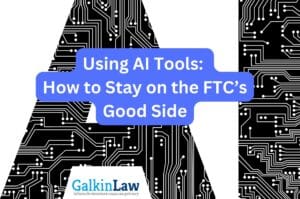
The Federal Trade Commission (FTC) explores the risks posed by artificial intelligence (AI) to consumers on a blog post on January 3, 2025, focusing on real-world harm rather than speculative existential threats.
AI systems, from chatbots to facial recognition, are embedded in everyday interactions, influencing access to healthcare, housing, employment, and financial opportunities. The FTC underscores that AI is not exempt from existing competition and consumer protection laws.
Key Takeaways
- Addressing Pre-Deployment and Ongoing Risks
Companies must assess and mitigate harm before deploying AI tools. An example is the FTC’s action against Rite Aid for using facial recognition technology (FRT) that disproportionately flagged women and people of color as shoplifters, without adequate testing or monitoring. - Combatting AI-Enabled Fraud and Misuse
The FTC is tackling impersonation and fraud exacerbated by AI. Recent initiatives, such as the Voice Cloning Challenge and rules against AI-powered deepfakes, aim to protect consumers from scams, non-consensual imagery, and other harms. - Preventing Deceptive AI Claims
Misleading promises about AI tools often result in financial and personal harm. The FTC has acted against companies like Evolv Technologies and Intellivision Technologies for overstated claims and deceptive practices related to AI-driven products. - Ensuring Privacy and Security by Design
With massive data requirements, generative AI raises significant privacy concerns. The FTC’s actions against Amazon Alexa highlight the need for transparency and secure handling of sensitive data, especially for children. - Setting Accountability Standards
The FTC emphasizes aligning liability with control, crafting remedies to prevent harm, and addressing the incentives behind AI business models to protect consumers effectively.
Practice Tips for Businesses
- Conduct thorough testing of AI tools for accuracy, fairness, and reliability before and during deployment.
- Implement robust safeguards to prevent misuse, such as deepfake detection and fraud prevention measures.
- Be transparent about AI tool capabilities and limitations to avoid deceptive claims.
- Prioritize data privacy by securing sensitive inputs and ensuring compliance with existing regulations.
- Stay informed on FTC guidance and enforcement actions to anticipate compliance expectations.
#AICompliance #ConsumerProtection #PrivacyMatters #FTCEnforcement #ResponsibleAI
